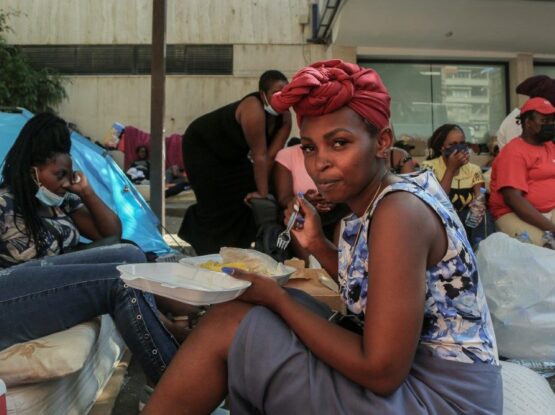KENYAN LABOUR MIGRATION
Every year thousands of Kenyans, increasingly women migrate to the Middle East to seek employment opportunities.
Kenya is a major source of migrant domestic
labour for the Middle East.
There are an estimated 100,000 to 300,000 Kenyan migrant workers living and working in the Middle East. The top destinations for Kenyans include Saudi Arabia, Qatar, UAE, Lebanon and Bahrain where many engage in domestic care, hospitality and hospitality work. Many Kenyans are driven to seek employment opportunities abroad by:

HIGH UNEMPLOYMENT RATES
12.7% Open unemployment
21% Underemployment

LOW INCOME
46% Working poor estimated
83% of working population in informal sector with low wages.

FAMILY RESPONSIBILITIES
Many workers have children and extended family responsibilities.

PEER INFLUENCE
Some workers are influenced by their friends and social networks.
Recruitment
According to Labour laws, the recruitment process should be a four-way attested
communication between the worker, recruitment agency in Kenya & in the foreign
country and the employer.
Kenyan migrant workers have reported experiences of abuse and exploitation.
In practice, the process of foreign recruitment involves:
- Quick recruitment through advertisements, brokers or referrals
- Contract offer and signing with no attestation
- Quick processing of visa and travel documents
- Departure often with no training.

What leads to the abuse and exploitation?
Systemic, social and legal factors play a huge role in contributing to abusive and
exploitative practices by employer and recruitment agencies of migrant workers.

KAFALA SYSTEM
Kafala is an employment system that legally binds migrant workers to their employer.
Kafala is the biggest enabling factor for the abuse of Migrant workers. It:
- Makes employers sponsor visas for workers and obtain & renew their residence permits.
- Restricts workers’ ability to change jobs.
- Prevents workers from leaving the country without their employers’ permission
- Encourages employers to report their workers as having absconded which can lead to their arrests or deportation
- Necessitate a live-in arrangement leading to social isolation.

EXCLUSION FROM LABOUR LAWS
In many countries of destination, some migrant workers are excluded from National labour laws in particular migrant domestic workers.
The exclusion of MDWs results in depriving these workers of the most basic rights enshrined in the Labour Law and others imposed by international labour conventions such as the minimum wage, paid annual leave, rest and recourse to arbitration councils for work grievances.

WEAK ENFORCEMENT OF LAWS PROTECTING MIGRANT WORKERS’ RIGHTS
Where there have been some potential reforms towards protecting migrant workers in both the sending and receiving countries, there's a general culture of weak enforcement of these laws in practice. No implementation and enforcement mechanisms are put in place.

PROHIBITION FROM UNIONISING
In the countries of destination, Migrant workers are forbidden from unioning and engaging in any form of collective bargaining action impeding efforts aimed at advocating for better social and labour protections.
What has the Kenyan government done so far?
The government does not have a comprehensive labour migration policy. However, there are a number
of labour regulations and reforms aimed at protecting Migrant workers including:

ESTABLISHMENT OF NEA
NEA was established in 2016 to regulate foreign employment of Kenyans and is responsible for registration and regulation of recruitment agencies.

ACCREDITATION
Migrant workers are required to have their foreign contracts accredited by a labour ministry official.

REPATRIATION BOND
All recruitment agencies are required to pay a KES 1.5 million security bond for repatriation purposes and payment of wages when contracts are breached by employers.

LABOUR AGREEMENTS
The Kenyan government has signed bilateral labour agreements with Saudi Arabia, Qatar and UAE to protect Kenyan migrant workers’ rights abroad.

PRE-DEPARTURE TRAINING
Migrant workers are required to complete a one month pre-departure training provided by accredited training schools approved by both NEA and the National Industrial Training Authority (NITA).

LABOUR ATTACHES
As part of the signed bilateral labour agreements with the Saudi Arabia, Qatar and UAE, the Kenyan government agreed to station labour attaches within these countries dealing with migrant workers' matters.
